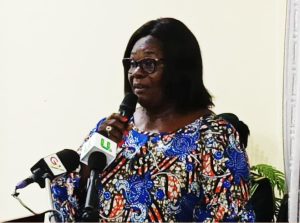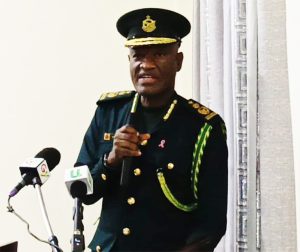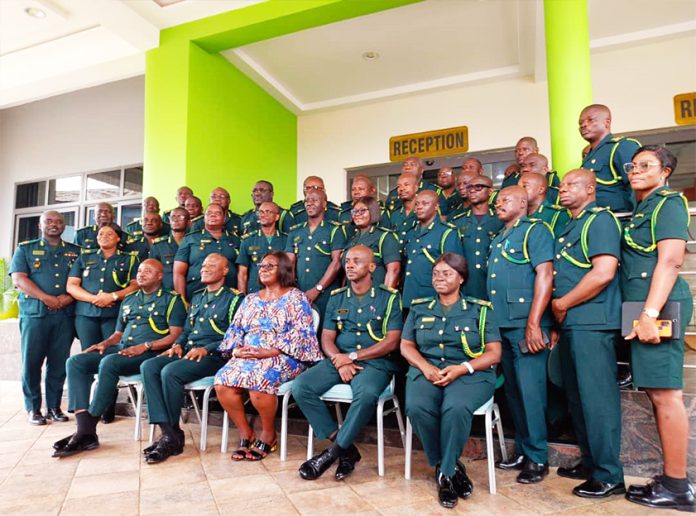The Deputy Minister for the Interior, Naana Eyiah, has charged the various security agencies, particularly Ghana Immigration Service (GIS) to be extremely vigilant at the borders as the country prepares for the December 7 presidential and parliamentary elections.
“As we approach the December general election, it is even more crucial to intensify our efforts to protect the territorial integrity of our borders and it is particularly important, given the rapid spread of terrorism and violent extremism in Sub-Saharan Africa,” she said.

The deputy Minister of Interior made the call at a three (3) day Conference of 2024 Management and Regional Commanders of the GIS, here in the Eastern Regional capital, Koforidua.
She assured the public of government’s willingness to continue to work with the Ghana Immigration Service and other border management institutions to strengthen Ghana’s security and scale up initiatives that will contribute to securing the territorial integrity of the country.
Naana Eyiah told GIS members that security was a collective responsibility that cannot be shouldered by a single institution and, therefore, urged the service to strengthen their collaboration with sister security agencies in an effort to protect our borders.
“The Ghana Immigration Service has a huge task, as the lead agency in our land border management system, as enshrined in Ghana’s National Security Strategy and I have no doubt that your capabilities will live up to that mandate.
“In today’s intricate and ever-evolving threat landscape, our collective responsibility to ensure safety and security for our dear country has never been more critical. As security officers, we must stay vigilant, proactive and collaborative to counter emerging risks,” she stated.
The Deputy Minister applauded GIS, particularly under the current leadership, for helping to forge stronger ties with key partners in strengthening the territorial borders to reduce irregular migration, prevent terrorism and violent extremism and transnational organised crimes.
She advised GIS to continue to strengthen its collaboration with all national and international stakeholders for effective and efficient migration management, adding that effective border management will enhance Ghana’s security and facilitate travel and trade for development.
The Controller-General of Ghana Immigration Service (GIS), Mr. Kwame Asuah Takyi, on his part assured the minister and Ghanaians of his outfit’s commitment to religiously and jealously protect the borders of Ghana before, during and after the December 7 presidential and parliamentary elections.
According to him, December 7 elections poses a unique set of challenges with national security concerns at the forefront, hence the Service remains proactive, vigilant and prepared to mitigate potential risks, especially at the borders and ensure a secure environment for the conduct of the general elections.
To him, instability has been recurring in the Sahel regions and West Africa, as violent events have become more frequent and deadly in recent times, a situation the Service was much aware of and ready for any risk.
He noted that it was imperative for the GIS to enhance its strategies by monitoring and ensuring tactical response to potential threats and particularly, community engagement and policing.

“Due to the expiration of the 2018-2022 Strategic Plan by the Service, GIS, with the support of the International Centre Migration Policy Development (ICMPD) has developed a 7-year Strategic Plan aimed at guiding the strategic direction of the Service for the next seven years,” Mr. Asuah Takyi explained.
Throwing light on the plan, he disclosed that the strategic plan would help address existing gaps and needs to position the GIS on the trajectory for improved efficiency and effectiveness to ensure the safety and protection of migrants, travellers and citizens alike.
“The 7-year Strategic Plan (2023-2029 Strategic Plan), which was launched in October 2023, is to be delivered through a two-year Action Plan that breaks down the broad strategic objectives into outcomes, outputs, activities and inputs as the first two-year Action Plan (2023-22024) comes to an end”
Mr. Asuah Takyi articulated that there was the need to commence the process of drafting the next two-year action plan to guide the activities and initiatives of the service for the next two years towards actualizing the overarching strategic objectives outlined in the seven-year strategic plan (2023-2029).
He disclosed that there would be a presentation on the proposed activities from the various GIS Regional Commands and the validation of the same for incorporation into their next action plan (2025-2026), which is crucial for mapping out the strategic actions and initiatives of the service for the next two years.
According to him, the Service will examine the Joint Mobile Team concept, which has been key in enhancing their operational capabilities.
“Let me reiterate that this conference is not just about highlighting our achievements or identifying challenges, but also about crafting solutions and strategies that will position the GIS in the forefront of national security as a forward-thinking, responsive institution, especially in this election period,” said Mr. Asuah Takyi.
“We must be reminded, referencing the 2020 National Security Strategy that our responsibility extends beyond border control – it is about contributing significantly to ensuring the safety and security of the entire nation”.










